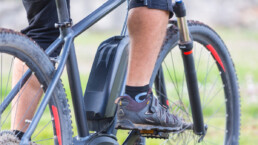Electric bikes are the future of transportation. They are ecologically sustainable, support a healthy lifestyle, provide freedom and convenience, and can lower your commuting costs.
By the end of 2023, global sales of electric bikes could reach $37.83 billion, a figure that might double in the next 5 years.
Commonly referred to as eBikes, these devices are not only electrically motorized, but also computerized and connected. Developing an electric bike is no easy task, however. Under the simplicity we see on the surface, there are multiple factors and elements to be designed and considered: the bike’s frame and shape, materials, weight, battery, drivetrain and motor, and multiple other components like handlebars and seats. The relationship with the surrounding infrastructure and environment must also be considered – like safety, and charging opportunities. On top of this, there is still the software, which becomes a significant differentiator for the bike, allowing the provider to continuously enrich the biking experience with new features. This means that no device escapes the exponential growth of data in the world we live in.
eBike storage software challenges
Tuxera was selected by one of the leading eBike system manufacturers to overcome embedded data management challenges in the onboard computer of their eBike systems. We were also tasked with enabling differentiating data use cases – now and in the future –for the users of these vehicles.
Our customer faced a number of storage challenges in their eBike system:
- This customer’s eBike system used SQLite to collect and store logs and structured data – like battery levels, cycling data – that is used by the application. A database approach is efficient for the application, but the flash media will end up suffering from write amplification, because this particular SQLite workload is write-intensive: multiple small updates are being performed. The challenge here was: how can data integrity be guaranteed while avoiding reduced lifetime of the media and performance hits to the system?
- Writes can also be increased by the need to perform more frequent over-the-air updates to provide users with improved security, new features to differentiate, or bug fixes. As it is not always possible to plan the data workload ahead of time, the customer needed data management software that would be “future-proof.”
- To meet regulatory requirements, this customer wanted the ability to ensure that any deleted data is expunged and no longer accessible – securely erased data in the NAND media should not be recoverable.
- eBikes are safety-critical systems. Our customer naturally has in place very strict standards, quality controls, and procedures for their suppliers. In addition to the reliability of our software product itself, software development lifecycle activities needed to be audited and monitored as part of their quality and verification processes.
The solution – Tuxera Reliance Edge
According to the customer, “Reliance Edge was the only solution giving us the needed flexibility to balance fail-safety and performance, while meeting all non-functional requirements demanded by the eBike market.”
Optimized performance and data integrity
A file system’s approach to reliability and fail-safety has an impact on the lifetime of the storage media. Journaling file systems create overhead because they need to perform additional writes to the journal file, in order to reduce the risk of losing data in case of power-off. Tuxera Reliance Edge is a copy-on-write transactional file system, so there is no need to keep a journal in order to make the system extremely fault tolerant. This approach is easy on the media and protects data from corruption. Reliance Edge also met the customers’ performance requirements – our proprietary file system shows a performance advantage for small files, especially when the write sizes are smaller than the block size and has configurable options to give developers control in optimizing performance for their particular workload.
Fail-safe OTA support
Reliance Edge reliably supports over-the-air (OTA) update scenarios. The file system’s architecture lets the developer define “atomic operations” through transaction points, keeping data-at-risk safe. For example, on an OTA scenario with Reliance Edge:
- Make a last transaction point and suspend further transactions
- Perform the update
- Lock the update in with the single transaction point
- Resume the previous transaction settings
If the power is lost during step 2 above, the system reverts to the previous point – nothing corrupted, nothing lost.
Secure data erasure
Reliance Edge features a secure erase sanitization method for completely erasing data off of a device. It gives the developers control to expunge data at the time of their choosing and work closely with the media to securely discard, sanitize, and trim old data.
Quality and excellence in operations
Our development process includes rigorous quality assurance testing, ensuring the software works to spec in your specific system. We provide traceability to customer requirements, test reports, and code metrics. We are ISO 9001 certified and are able to comply to ASPICE standards according to project requests. This helps our customers to meet stringent quality and safety needs.
Final thoughts
Electric bikes are on the rise – they are environmentally friendly, healthy, convenient, and also smart. They demand a long lifetime from their flash memory, as well as data storage software that can ensure a balance of fail-safety and system performance while meeting industry safety standards.
Tuxera’s decades of experience in storage software helps you overcome any data challenge on eBike systems, providing reliable, secure and high-performance data management solutions — all while conforming to the most demanding software engineering processes, verification, and quality standards.
Looking to maximize the performance, fail-safety, and lifetime of your safety-critical system?


